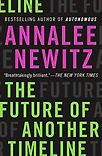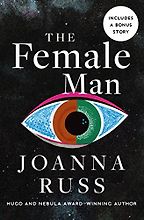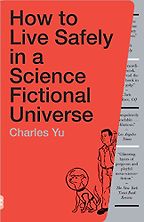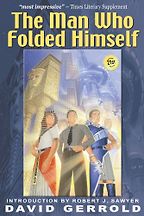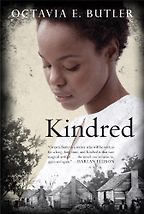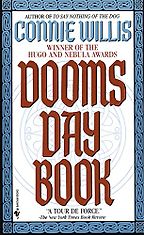As the author of the highly acclaimed novel The Future of Another Timeline, you’ve agreed to recommend us five of the best time travel books. On your website you write that your science fiction is inspired by the technology you cover as a science journalist, but that comes with a disclaimer: “Warning: not all contents are entirely based on plausible scientific principles.” I suspect this is where time travel comes in.
Yes, The Future of Another Timeline is not based on science, unfortunately. In most of my science fiction I do actually try to trace it back to some plausible origin. But I was disappointed here; when I interviewed physicists, they all pretty much said: ‘Time travel is never going to happen.’ What drew me to it is that it’s less teaching people about how science works, and more about teaching people how history works.
I think that’s why time travel is such a satisfying fantasy – at least the version of it that I do in my book, where characters can actually change the past. It becomes a metaphor for how we change things in the present, as well as how our relationship to the past changes us in the present. Here in the US, for example, we’ve just had a huge debate over how slavery should be taught in history classes – because the way we teach slavery, and the way we understand it, changes our relationships in the present day. History is so powerful.
It’s frustrating because, unlike a scientific phenomenon, you can’t just pull up a chart or point to it and say, ‘I have one particle of history right here.’ We all disagree over the goddamn particle – what direction it’s moving in, what way it’s spinning. So that’s frustrating, right? The allure of time travel is: we will go back there, and we will figure out exactly what happened. Which of course forgets that even when something happens in the present, right there in front of you, two people could still plausibly disagree over what just happened.
In times when politics are just so unstable – as they are in so many countries right now – it makes the fantasy even more enticing, because it’s about going back and making things stable, or going back and understanding the origin of the instability, or just feeling like you have some control over what’s happening. So, all of that stuff goes into my love of time travel, and I think that’s what draws people to those stories.
Absolutely, and you’ve selected some absolute classics for us to discuss. Let’s talk about your first choice: Joanna Russ’s The Female Man, published in 1975.
This is one of the science fiction novels that influenced me from the very beginning. I read it when I was in college, having stopped reading science fiction for a while but come back to it. There’s definitely both a science fictional element and a kind of magic realist element to this book.
It’s the story of three women living in different time periods, kind of alternate histories. As the book unfolds, we start to think that maybe these are all the same woman. One is living in a kind of alternate 1930s. One of them is from the future, where there’s a battle between patriarchs and feminists – she’s a warrior. And she comes back in time to the 1960s, the ‘present day’, to try to change things, where she winds up having an ambiguous romance with one of the women in the present.
And, at the same time, on top of this time travel story – which is your classic ‘I’ve come to warn you about a dangerous future’ story – it’s also a record of all the mundane microaggressions that women are experiencing in all these different contexts and places. For me, that’s the part that really stood out. Joanna Russ is such a great observer of human behaviour, and she’s really sensitive to how different historical periods produce different kinds of gender-based insults and aggressions.
“Time travel becomes a metaphor for how we change things in the present”
There’s a fantastic scene at a faculty party for professors in a humanities department, which is written as a play. It’s just dude after dude making these snotty little assertions about women, and our character – who’s a woman professor – having to navigate this room full of assholes. That was set in what was then the present day. Reading it now, it feels like a glimpse of second wave feminist history.
So it’s just delightful: really angry and fierce, just like all of Joanna Russ’s work, and it has some pretty weird twists and turns. It still holds up, especially if you look at it as a record of this moment in feminism when women were finally pushing back – and how they did it.
There’s a character, Jeannine, who lives in the timeline in which the Great Depression never ended. It suggests that the financial crisis caused women to rely ever more on men and marriage. This feels newly relevant again, having read a lot about how lockdown and the resultant economic crash is having a disproportionate impact on women.
One of the big existential threats for women, especially feminists, is that with just a few wrong turns politically, we could once again be reduced to property. That’s obviously the fear at the heart of The Handmaid’s Tale, where suddenly there’s a presidential decree that states that women can no longer control their finances. That’s the big turning point in the dystopia.
So, like a lot of women, Joanna Russ was really haunted by that fear. You know: ‘What if I couldn’t have a job, and had to rely on men?’ That’s terrifying. So there are a lot of ways that can happen – through economic downturn, through the rise of a really right-wing government… And, like I said, this book is a smorgasboard of the terrible things that can transform gender relationships, and make them less equitable.
The main character is called ‘Joanna,’ which I thought was a nice postmodern detail.
Actually, you see this a lot in time travel books. It’s interesting. I mean, Joanna Russ was very much playing with the postmodern literary ideas that became popular in the 1970s and 1980s, the ones that Kathy Acker was playing with later – putting yourself into a story. But one of my other picks, the Charles Yu novel, does the same thing.
Yes, let’s move on to that. This is Charles Yu’s How to Live Safely in a Science Fictional Universe.
The character is named Charles and is visiting himself and having internal debates with different versions of himself. Different kinds of weird temporal anomalies start haunting his whole life. I think there’s something about time travel that invites this kind of meta-relationship with one’s self. Because that’s the other fantasy of time travel: getting to meet yourself and have a conversation with yourself, and try to figure out why you did all those dumb things.
Tell us more about the concept of the book.
Yu is a guy who is travelling around in a time machine. There are a couple of hints about what he’s doing. He is a time machine repairman working for a company, but he might be doing things to try to fix his own life. And the narrative is interspersed with stories about his childhood, his relationship with his father – who was desperately trying to invent a time machine – and his relationship with his mother who – and this is one of the parts of the book that I love – is stuck in a time loop.
Time loop?
She’s reliving the same moments over and over again, like she’s in a Groundhog Day trope. So she’s travelling through time also, but in a really different way to the main character. That was one of the things I loved about this book – that it’s really about time travel, and also about our different relationships with time and how psychological problems can manifest themselves as temporal anomalies.
Oh, I get it. Clever.
Part of the point of the book is that this main character is so haunted by his childhood that it’s kind of kicked him out of time. Like The Female Man, even though it deals with these sombre themes of loss and unrequited love – I don’t necessarily mean romantic love – it’s incredibly funny. His voice, Charles Yu’s voice, is just so hilarious. And he’s very wise, and makes lots of great pop culture references. It’s a commentary on time travel, but at the same time a very straightforward story about childhood, and how to grow up from childhood trauma.
This book has popped up on our site before. Beth Bloom, an English professor at Harvard, recommended it as a ‘self-help novel,’ and said that he “uses the concept of time travel to think through common and practical questions of how to deal with nostalgia, parents, immigration and regret.”
I would endorse that, for sure. A lot of it does deal with immigration and with feeling a kind of cultural dislocation. There are a couple of great moments where he talks, for example, about how his father speaks Mandarin, which doesn’t have tenses. Or, it doesn’t have verb tenses, although it has other tense markers. That causes problems for his dad, because he’s trying to think through time travel in a language that deals with time in a different way to the way English does. I really loved that detail. It’s a kind of Easter egg moment, when you hear the characters referencing that. So that’s really delightful.
It’s a great literary book, for the fun he has with language and time – but also, it’s just a fun story too. A bit of a romp.
You mentioned the time travel book fantasy of meeting ourselves a few moments ago. I think that brings us to The Man Who Folded Himself by David Gerrold…
I think it does! David Gerrold is probably most well-known for writing the Star Trek episode “The Trouble with Tribbles,” which is a classic, incredibly silly, episode from the original Star Trek, where suddenly a bunch of tiny, fluffy, squeaky balls start reproducing like bunnies on the Enterprise. He wrote that when he was, I think, 18 – or, he was very young – and it was his first sale. He went on to do a lot more science fiction that was silly, but with an underlying story about sexuality at the same time.
The Man Who Folded Himself came out around the same time as The Female Man. It’s about a guy who discovers that his family has this device, a belt that allows you to travel through time, and his uncle has been basically using it to play the stock market. He passes it on to the main character and is like, ‘Here, do this to get rich,’ basically. So from the outset you know that these are not characters who are going to be trying to ‘preserve the timeline,’ the way a classic time traveller does. They’re like, ‘Nope, we’re here to get rich and have fun!’
“It’s less teaching people about how science works, and more teaching people how history works”
So he goes around doing that. But mostly what he does is meet versions of himself. He keeps re-encountering himself for a variety of reasons, and at a certain point there are so many versions of himself travelling around and crossing paths that they all buy a giant luxury timeshare together. There are hundreds of them. And they have giant orgies. He meets a female version of himself, but he also has a lot of gay orgies with himself in this book, which I find delightful, because it’s the kind of time travel thought experiment that we’ve all imagined, but David Gerrold went there! He was like: ‘Yeah, of course I want to have sex with 1000 versions of myself.’
He was openly gay at a time when being openly gay in Hollywood and in the publishing industry was a lot harder than it is now. And he just leaned into it. He was like: ‘This is what it’s all about! Gay time travel!”
Excellent.
I think there’s probably something inherently queer about time travel. Joanna Russ would probably agree with me. David Gerrold is the master of this.
This book reminds me a lot of Back to the Future in terms of tone. It’s very light. There’s no horrible threat, no childhood trauma. Just, ‘hey man, it’s the seventies, let’s get high.’ It’s delightful. It’s a bit of a time capsule, but at the same time, no one else has written that story since – you know, fun gay orgies with yourself. So I hope we can bring back the happy gay time travel story.
Here’s hoping. Talking about meeting a past version of yourself, can we talk a little about the paradoxes of time travel, and how authors deal with that – or get around it?
Sure. As an author of a time travel book, I was not interested in paradoxes. I’m just not personally invested in the paradox structure. But it is, of course, incredibly important to the genre – you know, the idea that you could go back in time and change your own history. That leads to a number of different paradoxes. Could you become your own grandfather? Or does your dad always have to go back in time to impregnate your mom?
These kinds of questions fit neatly into the idea of “preserving the timeline,” or keeping history exactly as it was. And that’s a really easy plot device: we have to preserve the timeline to avoid the paradox. So you can see why people get into it, and why it’s a fun mental exercise. But if you play out the paradox, plot-wise, you see that the only endgame is going to be: ‘okay, then we have to make sure everything happens in exactly the same way it has already happened.’ I’m sure there are exceptions, but I think this plot device lends itself to a conservative bent in time travel stories. You can’t change history, only preserve it, no matter how terrible it was. Because if you don’t, you won’t be born. Or, your country won’t be founded. Something like that. Trying to preserve the past is the time travel equivalent of saying “Make America great again.” Don’t change the past, and don’t change the present.
Alternatively, you could toss the paradox thing out and say: “Screw it. We’re going to change the past.” I think that’s the more interesting and radical approach.
Which is what you do in The Future of Another Timeline.
But I must confess that one of my very favourite time travel novels is all about the paradox.
This is your next recommendation, Octavia Butler’s Kindred.
It’s a real classic. Butler gives a really different twist to the question of preserving the timeline. This is another book from the 1970s. She’s a writer, and she’s black, and she’s happily partnered with this white guy. Then she’s snatched back in time – she doesn’t know why, it’s just a weird, sort of magical thing, there’s no time machine or anything – to a plantation in the American South before the Civil War.
It’s a plantation with slaves, and it turns out that her ancestor – her great, great, great… I don’t know how many greats – was a slave owner. So she’s been sent back to do the classic time travel plot: protect your ancestors so that you can be born. Except her ancestor is this racist bastard who raped her female ancestor. She basically has to become friends with this guy, to protect him. At a certain point, her white partner is sucked back in time as well, and has to cope with living in the Antebellum South. So we get to see their different experiences as a white person and a black person.
“She’s beloved in the sci-fi community, she’s treated as literature in English departments, and she’s just a giant of 20th-century fiction, period”
For me, as a reader and writer, the only way I can get excited about a time travel paradox is when there are these larger social questions that have to be answered. Octavia Butler always forces you, as a reader, to jam your face right into all the contradictions and injustices in society, and how much we allow them to continue happening in order to survive.
So she’s posed this question: ‘What if you had to save your white, slave-owning ancestor?’ It’s such a great metaphor, or conceit, for why it is that we buy into unjust systems; how we get emotionally bribed into participating in systems that oppress us. It’s so good. There’s a reason this book is taught in so many classes. So my favourite paradox is Kindred.
Before we move on, could you speak a bit more about Butler’s significance to the field? I mean, Kindred is considered a classic of both science fiction and African American literature. She won all the awards going, I think.
Yes, she won many awards in her lifetime, including a MacArthur Fellowship, which is for literature in general. It’s a very nice pot of money intended to support the writer for, hopefully, the rest of their life. I believe she was the first science fiction writer to win it, so she’s a pioneer. She’s one of the writers that made it clear that science fiction was not some grubby, low-class genre; in fact, science fiction could be just as literary as Faulkner. So one of the great things about her is that she crossed over. She’s beloved in the science fiction community, she’s treated as literature in English departments, and she’s just a giant of 20th-century fiction, period.
Thanks. I think that brings us to the final time travel book recommendation you want to make: Connie Willis’s Doomsday Book. It’s about a time-travelling historian. I mean, perfect.
I love Connie Willis’s world-building around time travel. I think some of her most famous books are time travel novels. Doomsday Book is certainly one of her best-known books, although she’s written a number of novels and won lots of awards for them.
Like a number of the other authors we’ve talked about – Joanna Russ, Charles Yu, David Gerrold – she has a wicked sense of humour. Doomsday Book is not one of her comic novels, but it has a lot of funny bits. She’s able to balance a very tragic story of a historian going back in time to observe the Black Death – the 14th-century plague that knocked out almost 50% of the population. And she, the historian… I don’t know if this is a spoiler, if the book came out a billion years ago?
Oh, we’re very relaxed about that here.
Well, the historian is just intending to go back for a short period, just to witness – to see what history was really like. But she gets stuck. A classic time travel snafu: something goes wrong when she comes through the portal and she’s trapped in the Middle Ages for months. She has to figure out how to live. She doesn’t know if she’ll ever be rescued. So she integrates herself into the life of a small village. She’s taken in by a family and comes to really love them. As do we, as readers.
The thing that Connie Willis is great at – she’s like Charles Dickens– is evoking weird, eccentric lovable characters. By the time you’re halfway through this novel, you’re like: ‘I love all these people. All I want to do is read romance books about the people in this village.’ And that’s when she starts killing them with the plague.
It’s a great work – of historical fiction, almost. It really forcefully makes you understand what it’s like to live through a really deadly pandemic, which could literally kill an entire village. You know, we’re in a pandemic right now, so it might be an interesting book for people to pick up, just to make you feel a little better about living through a pandemic that’s killing a very tiny percentage of the population.
Five Books interviews are expensive to produce. If you're enjoying this interview, please support us by donating a small amount.
I love the conceit that time travel has been invented, but the only people who care about it are historians. It kind of reminds me of a time travel novella which I love by Kelly Robson, called Gods, Monsters, and the Lucky Peach. That’s very similar in that there’s time travel – holy shit! – but the only people who care about it are bureaucrats who work in environmental remediation, because they want to go back to ancient periods of time to take environmental samples, to see what the environment was like before pollution. So it’s a nerdy thing that only dorky scientists do. That’s exactly what Connie Willis captures: for some reason, nobody really cares about time travel except for this group of academics.
I definitely stole that idea for my novel, The Future of Another Timeline, where it’s basically academics puttering around in time, mostly just writing papers about it, which no one will read except their colleagues. We always imagine that if we had time travel, our whole world will be transformed, but from Connie Willis’s point of view it’s ‘yeah, a couple of people will write some dissertations.’
At the same time, like I said, it’s an incredibly moving book, and good for our time right now.
To close, could you tell us a little bit about the process of writing a time travel novel. How did you go about plotting this, with these moving timelines, and taking in real episodes in history? It must have required a lot of preparation and planning.
I did do a lot of research. My characters are from a little bit in the future, 2022. So, present day, basically, and they go back to the 1990s, which I lived through. So it wasn’t hard for me to recreate that. But then they go back to the 1890s, then back to 2000 years ago – classical antiquity. Then they go about half a billion years back, to the Ordovician period, long before there was life on land. Some of those periods I had written about before as a journalist. The Ordovician is one of my favourite geological periods; it was when life diversified the most, and spread across the oceans. Also, there was a giant supercontinent in the southern hemisphere, which is pretty rad. It was just a cool, cool time in the planet’s history.
So I already knew about that, although I did still interview a researcher about what you would eat if you went back to the Ordovician. I had thought they would eat trilobites, but he said no – trilobites didn’t have very much meat. He suggested that they eat giant sea snails. So that was fun.
Get the weekly Five Books newsletter
For the sections in the 1890s, where the characters go back to do political organising, they’re fighting against actual historical figures who were trying to destroy women’s rights. That took a lot of research, and as I was writing I kept doing more research and adding more stuff. Even when I was done, Patrick Nielsen Hayden, the editor-in-chief of Tor Books, read it and said: ‘I spent some time looking at train schedules from the 1890s and, actually, I think this is the train route they would have taken.’ So even the train routes are accurate, thanks to Patrick.
There were a lot of very tiny historical details that I was really concerned about. I was interested in things like how much a person would get paid to be a seamstress in 1892, that sort of thing. I wanted the past to feel really lived in. There are a few cosmic moments in the book — they are traveling through time and people talk about goddesses occasionally. But as a writer I was most interested in the research. And of course, I made a lot of charts, planning how the timeline would change and what things would diverge.
There’s a twist in the story, so I had to plot all that out. That was fun, but I will never do it again. Way too much plotting for me. In the novel I’m working on now, there’s no twist. There’s a giant volcano war, but no twist.
Finally: if you could time travel, knowing what you know about time travel from fiction, would you?
I guess it would depend on what kind of time travel. If it was super safe, I could just go back and hang out and come back Bill and Ted-style, then yes, I definitely would. For sure.
Interview by Cal Flyn, Deputy Editor
October 12, 2020. Updated: September 16, 2021
Five Books aims to keep its book recommendations and interviews up to date. If you are the interviewee and would like to update your choice of books (or even just what you say about them) please email us at [email protected]

